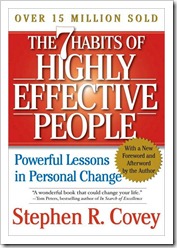One of my greatest personal development mentors, Stephen Covey, died earlier this week of complications from a bicycle accident. His book, The Seven Habits of Highly Effective People, has changed the lives of thousands of people around the world.
Today I would like to share the seven principles, followed by a few quotes Stephen Covey made about each. At the end of each one is a toolkit link, where you can find various tools to take action to better your life.
If you have never read this book, be sure to pick up a copy . It is full of insights that can help you become more organized, productive, and life a better life. Even though it was first published in 1989, it is still relevant today. Here are 14 quotes from Stephen Covey listed by relevance to each of the Seven Habits.
Habit 1: Be Proactive
“I am not a product of my circumstances. I am a product of my decisions.”
“If you haven’t been exercising, your body will undoubtedly protest this change in its comfortable downhill direction. You won’t like it at first. You may even hate it. But be proactive. Do it anyway. Even if it’s raining on the morning you’ve scheduled your jog, do it anyway. ‘Oh good! it’s raining! I get to develop my willpower as well as my body!’”
Toolkit: Create Your Own Life Plan (Michael Hyatt)
Habit 2: Begin with the End in Mind
“The main thing is to keep the main thing the main thing.”
“The key is not to prioritize what’s on your schedule, but to schedule your priorities.”
Toolkit: The Top Six Daily Planner
Habit 3: Put First Things First
“Most of us spend too much time on what is urgent and not enough time on what is important.”
“Keep in mind that you are always saying ‘no’ to something. If it isn’t to the apparent, urgent things in your life, it is probably to the most fundamental, highly important things. Even when the urgent is good, the good can keep you from your best, keep you from your unique contribution, if you let it.”
Toolkit: The 48 Minute Empower Hour
Habit 4: Think Win-Win
“Win/Win is a frame of mind and heart that constantly seeks mutual benefit in all human interactions. Win/Win means that agreements or solutions are mutually beneficial, mutually satisfying. With a Win/Win solution, all parties feel good about the decision and feel committed to the action plan. Win/Win sees life as a cooperative, not a competitive arena.”
“The way we see the problem is the problem.”
Toolkit: Win-Win Negotiation Worksheet. (Mind Tools)
Habit 5: Seek First to Understand, Then To Be Understood
“Empathic listening is so powerful because it gives you accurate data to work with. Instead of projecting your own autobiography and assuming thoughts, feelings, motives and interpretation, you’re dealing with the reality inside another person’s head and heart. You’re listening to understand. You’re focused on receiving the deep communication of another human soul.”
“Don’t push; be patient; be respectful.”
Toolkit 1: Listen Up
Toolkit 2: The Communications Success Kit
Habit 6: Synergize
“When you communicate synergistically, you are simply opening your mind and heart and expressions to new possibilities, new alternatives, new options.”
“Once people have experienced real synergy, they are never quite the same again. They know the possibility of having other such mind-expanding adventures in the future.”
Toolkit: The Fascination Advantage Test (Sally Hogshead)
Habit 7: Sharpen the Saw
“Peace of mind comes when your life is in harmony with true principles and values and in no other way.”
“This is the single most powerful investment we can ever make in life—investment in ourselves, in the only instrument we have with which to deal with life and to contribute.”
Toolkit: The Focused Fitness Planner
Question: What is your favorite “Habit” of the seven?

